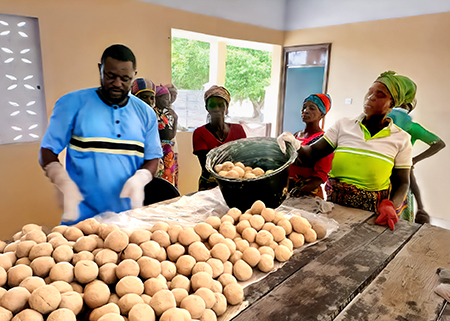“In Ghana,” says Wa site director, Pele, “shea butter is not just a product; it is a way of life.”
Shea butter is made from the nuts of the shea tree, which grows in Ghana’s savannah climates. A terrific moisturizer, it’s a popular ingredient in lotions, cosmetics, and soaps.

“It has been an essential part of the northern [Ghanaian] women’s economic culture for centuries,” Pele says, “who have been traditionally responsible for the harvesting and processing of the shea nuts…a practice that has been passed down from generations.”
“Anytime we use shea butter, we always remember the hard work and dedication that goes into processing it, and the rich history behind it.”
And when he says ‘hard work,’ he means it.
“Rural women usually wake up early dawn and join their peers in the fields for the harvest.” These are long days of picking ripe nuts, which then must be carefully sifted, washed, and sun-dried. They are then cracked to remove the kernels, which they roast in cauldrons, then grind using a mortar and pestle or stone.
“Their arms usually get tired, but they will continue to grind the kernels, knowing that the end product will be worth it,” Pele says.
They whip it, churn it, and leave it to cool and solidify. It’s finally ready to sell. But all this labour and time only yields a small batch. What’s more, butters made the ‘old-fashioned’ way fetch much lower prices in the markets.
The Wa site staff had a vision for a powerhouse shea production operation, and for that, they needed modern accoutrements. In partnership with Chalice, they envisioned their dream: a processing facility and training centre right there in Wa.
Thanks to Chalice donors, some of whom gave their support in the form of bequests or securities, the Wa team launched Shea Butter Women’s Centre project in 2022.
“When the women in the Wa West District heard that a shea butter processing centre is being constructed in the Wa site, they become overjoyed at the news,” says Pele.
The centre will include two sheds, one for boiling and one for kneading nuts. There will be a room for machinery which will process nuts into butter, and a drying platform. There will also be a borehole well. The new facilities will bring a “higher production capacity and a higher quality of shea butter, leading to increased profits for the rural women in the Wa Site.”
It will also be a “training center for women to learn about modern processing techniques, entrepreneurship, and financial management, equipping them with the necessary skills to start their own businesses.”
The community members are “extremely grateful and cannot wait.”



